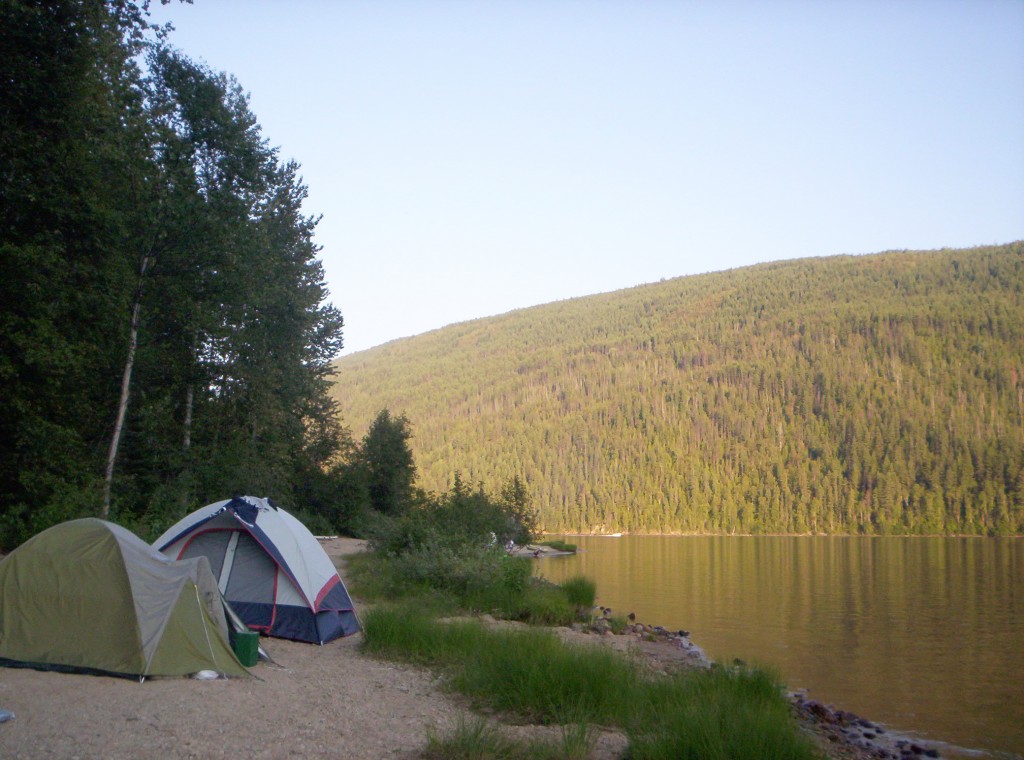How to Keep Mosquitos and Other Bugs Out of Your Tent

Mosquitos and other stinging and biting insects are a near-inevitable part of any camping trip, as those same warm temperatures that are great for camping are often ideal for insects? reproduction. While you'll never be able to totally rid your camping experience of these tiny pests -- after all, when you're camping you're visiting their home, not the other way around -- there are a variety of ways to minimize your contact with them.
BEFORE YOU LEAVE HOME
To maximize your chances of staying bug-free on your next camping trip, you'll need to get started before you ever even leave home. When you're getting together all your gear for the upcoming trip, set up your tent in the backyard and thoroughly inspect it for places where bugs might be able to enter. Look for things like rips in fabric (mesh sections tend to rip especially easily), zippers that don't quite zip all the way, and badly sewn or ripped seams. Patch up even the tiniest of holes; mosquitoes and other pests don't need much space to get through.
Believe it or not, the specifics of what you eat can make a difference when it comes to attracting or deterring bugs, too. Mosquitoes and a variety of other bugs that bite humans are attracted to the scent of human sweat, specifically lactic acid; in fact, mosquitoes can detect the scent of a human from as far away as 100 feet. During your camping trip and the days immediately prior, try to steer clear of foods rich in salt and potassium, as both will cause your body to produce more of the insect-enticing lactic acid.
CHOOSING A LOCATION
One of the easiest ways to avoid contact with biting and stinging insects is to do exactly that -- avoid them. Try to set up your tent away from places that tend to have an abundance of bugs. To avoid mosquitoes, try to pitch your tent as far away from standing water as possible. This includes everything from ponds to lakes to small puddles that might form due to rainwater. Even the camp's water fountains can provide an ideal breeding ground for the nasty bloodsuckers. Along with water, try to steer clear of other places that insects tend to gather, like dense vegetation and the areas directly beneath and around lights.
Aside from simply avoiding insect pests, other setup considerations can help you to keep your tent and campsite as bug-free as possible. If the weather's agreeable -- that is, if the air's warm enough and the wind isn't too strong -- try setting up in an area that's exposed to the wind, as this can make it much more difficult for bugs to hover around your campsite. Additionally, setting up your tent with the entrance facing into the wind will make it even more difficult for insects to fly into your tent.
AT DINNER TIME
When the time comes to cook up some food, there are a few things you can do to help keep the bugs away. Though food smells are one of the surest ways to attract bugs and even bigger campsite intruders like raccoons or bears, the fire that you use to cook your food will serve as a deterrent as long as it's burning. Despite insects? attraction to sources of light, the heat and smoke generated by fire tend to keep them away in the short term.
Because your fire will deter the majority of bugs that would otherwise be attracted to your food, it's the perfect place to eat dinner. It should go without saying, but never eat inside your tent. As we mentioned earlier, eating inside your tent is a great way to attract not only pesky insects, but larger, potentially dangerous animals like bears.
Food storage and clean-up is also enormously important when you're trying to control your exposure to insects while camping. Both before and after meal times, store all foods away from your tent, inside an airtight container. Leaving food items laying around your campsite -- especially sweet, sugary foods and drinks like barbecue sauce and soda -- is a great way to attract all kinds of unwanted visitors to your campsite. When you're finished eating, make sure to bury, burn, or thoroughly seal all food scraps and food-contaminated disposable items for packing out. Thoroughly rinse and wash all of your dishes and utensils after each use, and store them away from tent.
GENERAL TIPS
In addition to the suggestions we've already provided, there are a few other bits of information that can help you to steer clear of mosquitoes and other insects while you're camping this summer.
Leave the perfume at home - Just like sugary foods and drinks, sweet-smelling fragrances will attract bugs to you and your tent.
Keep bugs in the dark - As we mentioned earlier, bugs tend to be attracted to sources of light, so keep lamps and flashlights away from openings in your tent. When entering your tent after dark, turn your light off as you approach the tent, and don't turn it back on until you're inside with the doors thoroughly zipped tightly behind you.
Don't overlook the obvious - Though most of the suggestions we've offered here tend to involve additional preparation that can help to keep bugs out of your tent, don't forget all the standard bug-repellent sprays, citronella candles, and mosquito coils. Combine standard methods like these with the suggestions above for the maximum protection from summertime pests.
While it's pretty much impossible to totally rid yourself of mosquitoes and other pests during the course of a summer camping trip, following the above suggestions will help you to minimize your contact with them. After all, they live there; you're just a visitor.
Photo credit: "Camping by Barriere Lake, British Columbia - 20040801" by Koppertone (Justin Kopp). - Own work.. Licensed under Public domain via Wikimedia Commons.